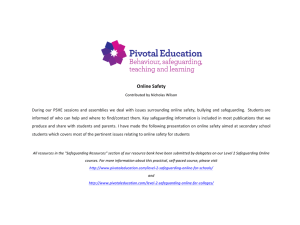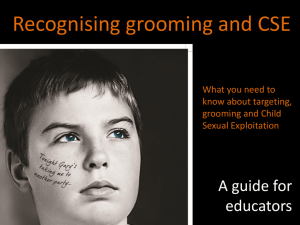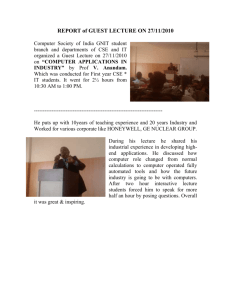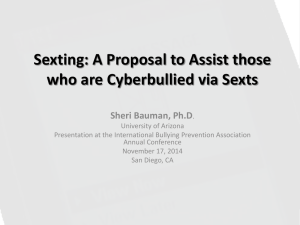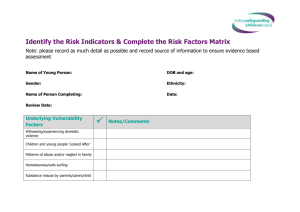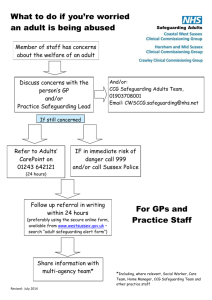A guide for Headteachers and DSLs
advertisement
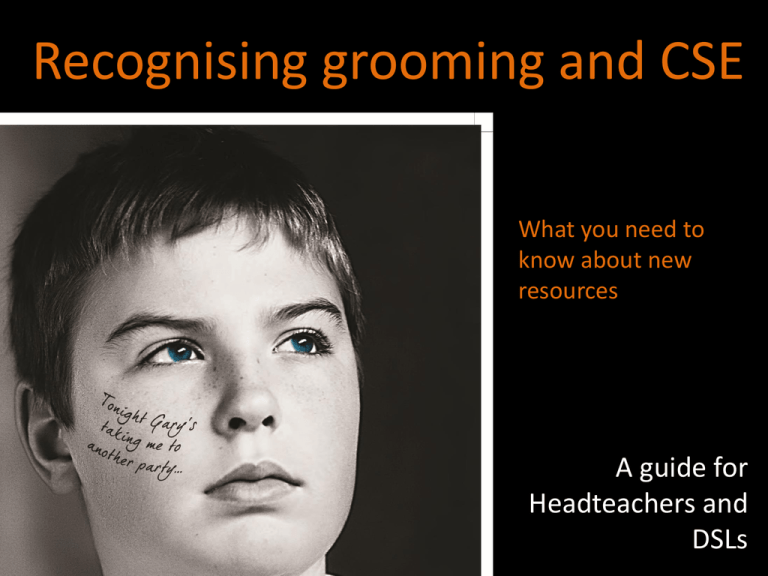
Recognising grooming and CSE What you need to know about new resources A guide for Headteachers and DSLs All family professionals working in Staffordshire today need to keep up to date with developments in CSE to tackle this growing problem What you need to know: • Incidences and working together • Education Safeguarding Advice Service • New resources for schools • Staff resource – grooming, CSE, consent, online, sexting • Getting involved in ‘Safer Internet Day’ - Pupil ‘sexting’ resource, parent resource and support in March activity • School representation on multiagency panels • What else do you need? Incidences in Staffordshire • We know it’s just the tip of the iceberg - more cases for all backgrounds, of all ages – it’s not just vulnerable children from disadvantaged backgrounds • But CSE is not being picked up in the levels expected. We’re making changes – new advice line, new publicity campaign new CSE Co-ordinators and new resources for schools, parents and young people • But we’d like to work closer with schools so that we can prevent more cases and increase appropriate reporting to help more young people. Education Safeguarding Advice Service – Your DSL must know this reporting route What? • Staffordshire Education Safeguarding Advice Service for advice previously given by the Education Safeguarding Officer • This will be the single education safeguarding route for those that do not require immediate referral or an issue outside of LST roles When? • This Is your first call for advice • BUT doesn’t replace First Response or First Response Team or Local Support Teams. • Designated Senior Person for Child Protection must refer safeguarding concerns appropriately and in a timely manner Why? • Links up safeguarding specialists , helps manage demand The new reporting pathway 1) Can you help the child yourself? Complete an Early Help Assessment with partners. The Education Safeguarding Advice Service on 01785 895836 can help you. 2) Is the child at risk? Complete a Risk Factor Matrix. Education Safeguarding Advice Service on 01785 895836 can help you 3) Does the child require immediate referral? If not, the Education Safeguarding Advice Service on 01785 895836 can help you. 4) Refer those at immediate risk to First Response on 0800 1313 126 or Staffordshire Police 101. If the child is immediate danger ring Staffs Police on 999. Resources for schools • We have developed a suite of new resources that are: • more age appropriate • more reflective of what young people, schools and parents want • Recommended by others New resources (on www.staffsscb.org.uk/professionals/sexting) 1. Improving CSE recognition and confidence of your staff The staff in your school need to stay alert to changes in the behaviour of children and young people, or any signs of abuse, and also help children avoid potentially dangerous relationships by understanding what a healthy relationship is and isn’t We have produced a presentation with new resources to help prevention, reporting, detection. Includes new resources to: • Understand and disrupt grooming and targeting • Understand sexting and disrupting it • Understand CSE, vulnerability factors, and remember the signs of CSE • Consent to sex – understanding the issues • A video that shows how professionals can really help young people • Being clear on reporting mechanisms – schools could be tackling some cases themselves with the right support • Touch on schools powers to seize electronic equipment • Supporting workforce development New resources (on www.staffsscb.org.uk/professionals/sexting) 2. Improving sexting recognition and understanding of new school powers • Schools have powers to seize and search electronic devices if there is a good reason to • A new standalone ‘Sexting’ presentation outlines new powers, when to engage with Police and with other people • Can be used for all staff but primarily targeted at Designated Safeguarding Leads New resources 3. A limited number of printed materials for teachers available for teachers • Leaflets • Calling cards New resources (on www.staffsscb.org.uk/CSE/professionals) Schools are asked to: 1) Ask staff to fill in the professional’s survey to aid with future workforce development and benchmarking 2) Roll out the general presentation to all staff (can be downloaded at www.staffsscb.org.uk/sexting ) 3) Ensure Designated Safeguarding Leads read the ‘Sexting’ resource about school powers 4) Download leaflets or order printed copies for staff New resource – ready to download (on www.staffsscb.org.uk/CSE/professionals) 4. Sexting resources for young people (and parents) Staffordshire Safeguarding Children Board (SSCB) are aware that sexting is becoming a massive issue that children and young people are facing locally and is becoming an increasing area of concern. Young people think it’s a normal part of a relationship. New resource – ready to download (on www.staffsscb.org.uk/professionals/sexting ) 5. Improving Internet safety – by tackling ‘sexting’ We have produced: • A complete package for pupils for national Safer Internet Day (9th Feb) specifically tackling ‘sexting’: • Three tried and tested videos for pupils – all okay for all ages - one specifically made in Staffordshire • Introduction to a new app, recommended by the NSPCC – ‘Zipit’ helping young people stay in control if asked to send a naked picture of themselves • Tips for young people to stay safe online • Also a link to a tried and tested guide for parents, to help them to talk to their children about online safety Supporting pupils and parents around Safer Internet Day: • • • We’re trying to get as many schools as possible to use the sexting resource during this time Schools can take part in PR activity – #nosextingplease Support the launch of the new website to pupils We ask that schools: • • • Use the resources online at www.staffsscb.org.uk/sexting in lessons Help measure how effective the resources are by asking them to fill in an online survey – will be available from Friday 22 January Support distribution of letters (and through their channels) to parents, highlighting new resources online to help them talk to their child about online safety (i.e. SMART rules and a Barnardo’s guide) – we know that young people of all ages want this! New resource – coming soon – for March 6. Birmingham BAIT resources • Tried and tested • Age appropriate DVD/ downloadable resources for schools • Accompanied by a 6 week educational programme • Will be rolled out shortly - we’ll let you know when ready and how this will be funded New resource – coming soon – for March 7. Helping pupils understand healthy relationships, recalling the signs of someone they know being exploited and knowing how to report (as age appropriate) Including: • • • • New website at www.knowabout cse.co.uk (currently in the final stages of development) New, simple, clear video on the signs of CSE Links to resources to help them understand healthy relationships (www.treatedbadly.co.uk and a supporting teaching resource) Schools can support by: • Using the videos and marketing materials, facilitating letters and communication to parents to watch online video • Take part in a PR and social media campaign to highlight the range of professionals that young people can talk to, if they have concerns CSE Panels CSE is not being picked up in the levels expected. Working closely will ensure we are. Schools are an essential part of that. What else do you need? So you know our plans in brief. Discussion: Is there anything else do you feel you need to support your staff, parents or pupils regards CSE? Thank you. Any questions?
